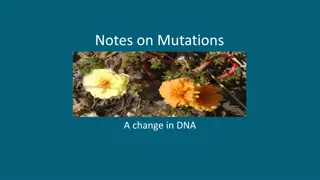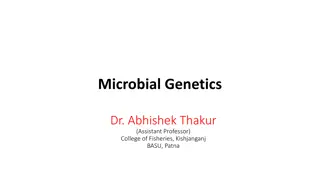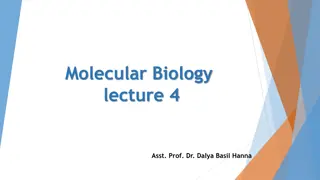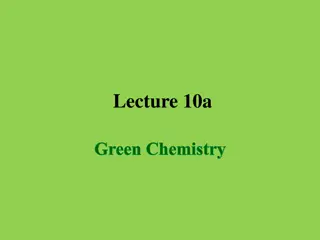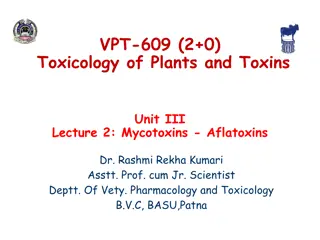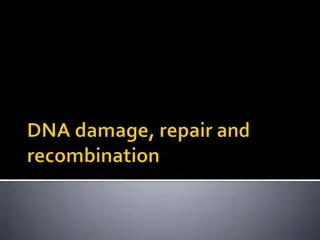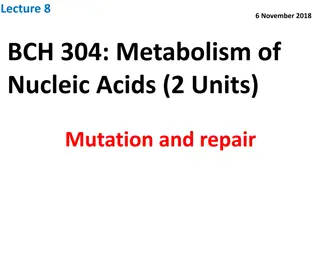Understanding Mutations in DNA and Their Effects
Mutations in DNA are changes that can occur in body cells or gametes, leading to alterations in the genetic code. Not all mutations are harmful, but they can impact protein structure and function. Different types of mutations, such as substitutions, insertions, and deletions, can result from various
0 views • 11 slides
Understanding Microbial Genetics and Mutations in Organisms
Explore the world of microbial genetics with Dr. Abhishek Thakur, an Assistant Professor specializing in Microbial Genetics at the College of Fisheries, Kishjanganj, BASU, Patna. Learn about important concepts such as strains, clones, genome, phenotype, genotype, genes, genetic recombination, and mu
0 views • 19 slides
Understanding Gene Mutations in Molecular Biology
Gene mutations play a significant role in molecular biology, leading to alterations in DNA sequences that can impact offspring. These mutations can arise spontaneously or be induced by various factors, such as mutagens. Understanding gene mutations is crucial for comprehending the genetic basis of c
2 views • 27 slides
Understanding Health Hazards in Chemical Production
Organic chemistry plays a vital role in producing various products, but it also poses serious health and environmental risks. Issues such as acute and chronic toxicity, carcinogens, mutagens, and teratogens are prevalent in chemical production. Awareness of these hazards has led to strict regulation
1 views • 30 slides
Understanding Aflatoxins: Mycotoxins and Toxicology in Plants
Mycotoxicoses refers to illnesses in humans or animals caused by ingesting substances produced by certain molds or fungi on food. Aflatoxins are a type of mycotoxin that are potent mutagens, carcinogens, teratogens, and liver damage agents. They were first discovered in the 1960s and are known to be
0 views • 16 slides
Understanding Mutagenesis, DNA Damage, Repair, and Recombination
Mutations in DNA, caused by various factors such as radiation and chemical mutagens, can lead to permanent changes in the genetic sequence. Repair mechanisms like direct reversal, excision repair, and trans-lesion DNA synthesis play crucial roles in maintaining DNA integrity and accuracy during repl
0 views • 31 slides
Understanding Causes of Mutations and Repair Mechanisms
Mutations can be classified into spontaneous and induced mutations based on their origin. Spontaneous mutations occur naturally, while induced mutations are caused by mutagens. Understanding the causes of mutations and repair mechanisms is vital in studying genetic variation and disease development.
0 views • 13 slides
